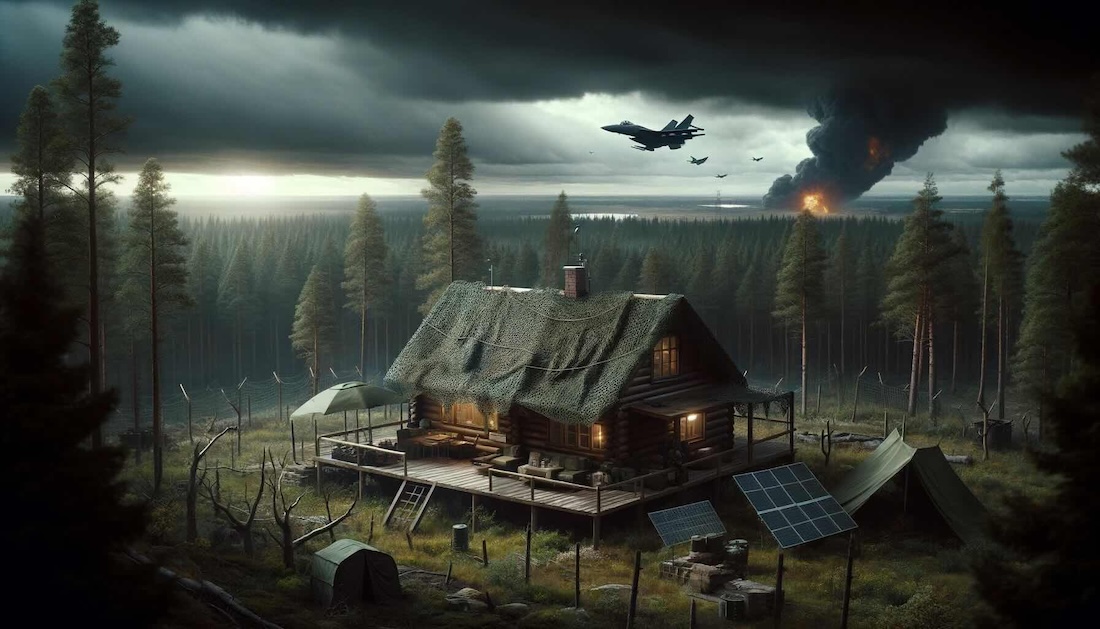What If………? The outbreak of World War 3, a scenario that once lurked in the realms of fiction, has become a harrowing reality. In this new world, fraught with uncertainties and dangers, off-grid living emerges not just as a lifestyle but as a strategy for survival. This article delves into the intricate dynamics of off-grid living in a world scarred by global conflict, exploring the challenges, opportunities, and essential strategies for resilience.
The Changing Landscape of Off-Grid Living
The New Normal: Self-Sufficiency as a Necessity
In a world where supply chains are shattered and resources scarce, off-grid living shifts from choice to necessity. The ability to generate your own power, grow your own food, and source water independently becomes vital. Off-grid homesteads transform into self-sustaining oases amidst the chaos.
Strategic Isolation: Safety in Remoteness
Off-grid properties, typically distant from urban centers, can offer safety from the immediate dangers of war, such as bombings or riots. This isolation, while a buffer, also poses its own set of challenges in terms of accessibility to external resources or emergency aid.
The Pros and Cons of Off-Grid Life During Wartime
Pros:
- Resource Independence: The ability to live without reliance on public utilities and supply systems is invaluable when these systems are compromised by war.
- Safety from Urban Risks: Distance from strategic targets or conflict zones reduces the risk of becoming a casualty of war.
- Sustainable Food and Water Sources: Growing your own food and having a sustainable water source become powerful advantages when conventional sources are disrupted.
- Community Resilience: Small off-grid communities may become self-reliant micro-societies, capable of supporting each other through barter and shared skills.
Cons:
- Vulnerability to External Threats: Isolation can also mean being cut off from aid, making off-grid properties potentially vulnerable to rogue elements or resource raids.
- Limited Medical Access: In emergencies, access to medical care could be critically hampered by the remoteness and lack of communication infrastructure.
- Psychological Strain: The stresses of self-reliance, coupled with the anxieties of a world at war, can be immense.
- Resource Management Challenges: Sustaining an adequate supply of essentials like food, fuel, and medical supplies without external inputs can be a daunting task.
Shop HERE for prepper supplies
Surviving and Thriving: Strategies for Off-Grid Resilience
Fortifying Your Homestead
- Enhance Security Measures: Consider reinforcing your property with enhanced security measures like fencing, surveillance, and safe rooms.
- Backup Systems: Have redundant systems for critical needs like water purification, energy sources, and food storage.
Building Community Networks
- Establish Communication Links: Set up reliable, non-digital communication methods like HAM radio to stay connected with the outside world and nearby communities.
- Foster Community Alliances: Build relationships with nearby off-grid communities for mutual support, resource sharing, and collective defense.
Self-Sustainability Enhancements
- Diversify Food Production: Engage in diverse farming practices, including permaculture and aquaponics, to ensure a steady food supply.
- Stockpile and Preserve: Accumulate a store of non-perishable food, seeds, medical supplies, and essential tools.
- Develop Survival Skills: From first aid to mechanical repairs, broadening your skill set is critical for self-reliance.
Preparing for Emergencies
- Emergency Response Plan: Have a clear plan for different scenarios, including medical emergencies, intrusions, or evacuations.
- Regular Drills and Training: Conduct regular drills to ensure everyone on the property is prepared to respond effectively to emergencies.
Conclusion: A Testament to Human Resilience
Off-grid living in the shadow of World War 3 is a profound testament to human resilience and adaptability. While fraught with challenges, it also offers a unique opportunity to forge a sustainable, self-reliant existence, even in the most turbulent times. As the world navigates this uncharted territory, off-grid homesteads stand as beacons of hope, showcasing the enduring spirit of humanity to not just survive, but thrive, against all odds.

